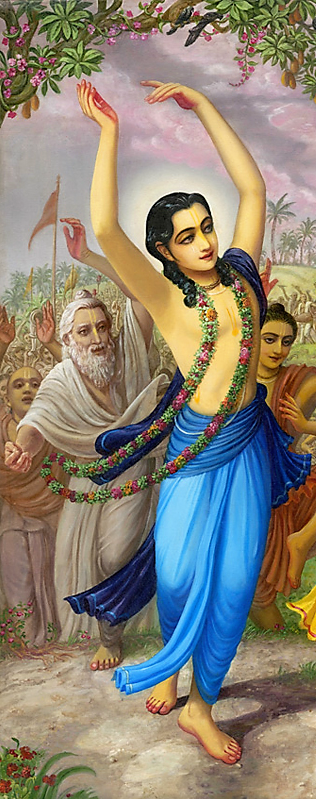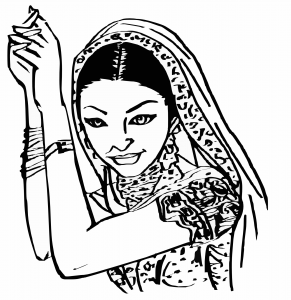 Still we see that Nityānanda Prabhu is the most merciful, even to the offenders. His nature is of a peculiar type, such that whom even Mahāprabhu is rejecting, He is keeping, giving assurance, “No, no, don’t be hopeless.” Nityananda Prabhu’s mercy was shown in this way in the pastime of Mahāprabhu and Kālā-Kṛṣṇadāsa.
Still we see that Nityānanda Prabhu is the most merciful, even to the offenders. His nature is of a peculiar type, such that whom even Mahāprabhu is rejecting, He is keeping, giving assurance, “No, no, don’t be hopeless.” Nityananda Prabhu’s mercy was shown in this way in the pastime of Mahāprabhu and Kālā-Kṛṣṇadāsa.
Kālā-Kṛṣṇadāsa was accompanying Mahāprabhu on His journey in South India, and there he did something wrong. He left Mahāprabhu’s personal association, enticed by the  Bhaṭṭathāris, the gypsy women. This occurred in the south, Kerala-Karnataka, the place of Madhvācārya. The people of that province, both men and women, are reputed to be very beautiful. Their complexion is very good, as well as their features and their figures; Gandhi referred to that place as the ‘land of the fairies’. Kālā-Kṛṣṇadāsa was enticed, and left Mahāprabhu’s association. That even in the direct company of Mahāprabhu, Kālā-Kṛṣṇadāsa was deviated is certainly for our instruction. But utilizing His special power, Mahāprabhu rescued Kālā-Kṛṣṇadāsa from the gypsy’ camp. Later, after taking him to Jagannātha Purī, Mahāprabhu released him from His service, saying, “He is of such a nature; but, anyhow, I have taken him from the hands of those villifiers. Now I release him; he may go anywhere.” But Nityānanda Prabhu utilized Kālā-Kṛṣṇadāsa, again giving him service, “Go to Śacī-devī and inform her that
Bhaṭṭathāris, the gypsy women. This occurred in the south, Kerala-Karnataka, the place of Madhvācārya. The people of that province, both men and women, are reputed to be very beautiful. Their complexion is very good, as well as their features and their figures; Gandhi referred to that place as the ‘land of the fairies’. Kālā-Kṛṣṇadāsa was enticed, and left Mahāprabhu’s association. That even in the direct company of Mahāprabhu, Kālā-Kṛṣṇadāsa was deviated is certainly for our instruction. But utilizing His special power, Mahāprabhu rescued Kālā-Kṛṣṇadāsa from the gypsy’ camp. Later, after taking him to Jagannātha Purī, Mahāprabhu released him from His service, saying, “He is of such a nature; but, anyhow, I have taken him from the hands of those villifiers. Now I release him; he may go anywhere.” But Nityānanda Prabhu utilized Kālā-Kṛṣṇadāsa, again giving him service, “Go to Śacī-devī and inform her that
Mahāprabhu has arrived in Purī safely after two years of touring in the south country. Give news of Mahāprabhu’s safe arrival to Śacī-devī.” Despite Mahāprabhu’s rejection, still Kālā-Kṛṣṇadāsa was utilized, by Nityānanda Prabhu.
I remember a similar case when I was preaching in Madras. Hayagrīva brahmacārī—later he became Śrīpād Mādhava Mahārāja—and I were preaching there, and we sent one boy to the Madras Centre of Gauḍīya Maṭha. He was staying there and serving as a brahmacārī, but then he became misguided. Śrīpād B.P. Tīrtha Mahārāja, who was at that time quite elderly, was in charge of the Maṭha there, and he punished that fallen brahmacārī by sending him away from the Maṭha. He managed to stay in some other place in the city, but then, after Śrīpād Tīrtha Mahārāja had left Madras, that boy came to Hayagrīva and I pleading, “You please give permission to let me stay in the Maṭha.” We told him, “Guru Mahārāja is very soon coming here; come at that time.” Then when Guru Mahārāja came to officially open the new lecture hall we put the case to him, “This boy came for service, but then he had to leave for such a reason; but now again he wants to stay in the Maṭha. What should we do with him?”
Then our Guru Mahārāja, Śrīla Bhaktisiddhānta Saraswatī Ṭhākura said, “Mahāprabhu did not take Kālā-Kṛṣṇadāsa after he was seduced when the Bhaṭṭathāris showed him a lady. So, I can’t accept him. But Nityānanda Prabhu kept him and gave him engagement. So you should keep him.” A peculiar position we then found ourselves in! I thought, “Gurudeva, you are all in all our leader, our unconditional Lord; you can’t accept him, then how can we give him shelter, being under your guidance?” That was a puzzle, “How can we do it? If you can’t accept, then how can we?” But Guru Mahārāja has said, “I can’t accept him; but you should keep him.” And we had to adjust to that.
From this we can trace the line of benevolence and causeless mercy. The line of causeless  mercy is extending from the Centre, but the extension gets the more intense position, “take yourself to the mercy department; perhaps, there is some arrangement to help, to accept you.” Just as in a hospital, the general department disappoints the patient, “No, we can’t accept such patients as you here. But, you may try the other department. There, you will find more accomodation.” And after going there and checking, the patient finds them to be of such type, “Here we can accept all. There is arrangement for you.” In this way we find the servants are more benevolent even more than their Lord. It is inconceivable.
mercy is extending from the Centre, but the extension gets the more intense position, “take yourself to the mercy department; perhaps, there is some arrangement to help, to accept you.” Just as in a hospital, the general department disappoints the patient, “No, we can’t accept such patients as you here. But, you may try the other department. There, you will find more accomodation.” And after going there and checking, the patient finds them to be of such type, “Here we can accept all. There is arrangement for you.” In this way we find the servants are more benevolent even more than their Lord. It is inconceivable.
―Śrīla Bhakti Rakṣaka Śrīdhara Mahārāja (Divine Aspiration)
Image/Art made possible by Pixabay.com








